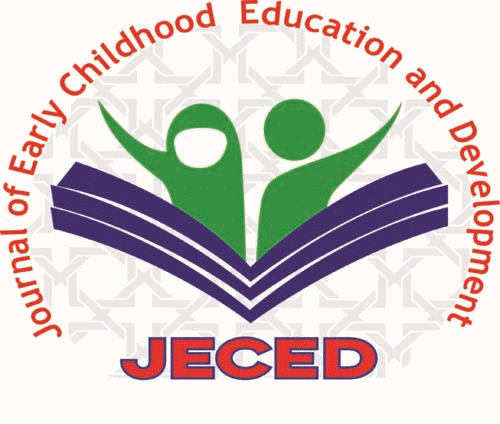Implementasi Nilai Kebangsaan sebagai Dasar Pendidikan Hukum untuk Anak Usia Dini
DOI:
https://doi.org/10.15642/jeced.v4i2.2236Keywords:
national values, Pancasila, educationAbstract
The development of quality Indonesian human resources is strongly influenced by the success of early childhood education. Problems in the field of law today require solving strategies from various fields. Early childhood education is a very important field in participating in solving legal problems in Indonesia. This writing provides an overview of how early childhood education plays a role in building the world of law in the future. The writing method used is literature study supported by various kinds of discussions in the form of focus group discussions and national seminars. The philosophy of Pancasila which continues to be studied and practiced by teachers in the early childhood environment will foster awareness of a quality nation that can be proud of in the global arena. This is because education does not only develop the potential of senses and logic for all involved in it but also develops the potential of conscience, instinct, intuition and imagination.
Downloads
References
Doherty, D., Bryan, A. C., Willis, R., & Witry, P. (2019). Representation Imperatives in the Public Mind. Social Science Quarterly, 100(6), 1964–1983. https://doi.org/10.1111/ssqu.12686
Faiz, F. (2017). Ngaji Filsafat: Sufi Nusantara - Sunan Kalijaga. Masjid Jenderal Sudirman. https://www.youtube.com/watch?v=wCfNKC9y66A
Faiz, F. (2018). Ngaji Filsafat: Rudolf Steiner - Waldorf Education. Masjid Jenderal Sudirman. https://www.youtube.com/watch?v=zJdC934ot94&t=961s
Hardiman, F. B. (2018). Demokrasi dan Sentimentalis (Widiantoro (ed.); 1 ed.). Kanisius.
Hardiman, F. B. (2019). DEMOKRASI DELIBERATIF (7 ed.). Kanisius.
Hardiman, F. B. (2021). Kritik Ideologi. Kanisius.
Hidayati, U. (2019). THE POLITICAL COMMUNICATION PROCESS AMONG CHINESE MOSLEM SOCIETY. Informasi, 49(2), 125–143. http://download.garuda.kemdikbud.go.id/article.php?article=1509403&val=477&title=The political communication process among Chinese moslem society
Irhas, I., Asrowi, A., & Diono, D. (2022). Digitalize Puppet Games as an Innovation for the Implementation of Character Education in Elementary: A Literature Overview. International Journal of Instructional Technology and Educational Studies, 3(3), 1–5. https://doi.org/10.21608/ihites.2022.112816.1097
Ivinson, G. (2020). The power of living knowledge: re-imagining horizontal knowledge. Asia-Pacific Journal of Teacher Education, 48(1), 1–16. https://doi.org/10.1080/1359866X.2019.1696453
Kaelan. (2014). The Philosophy of Pancasila (1 ed.). Paradigma Press.
Laia, A., & Hulu, F. (2022). ANALISIS SIKAP TOLERANSI MASYARAKAT MELALUI KEGIATAN GOTONG ROYONG DI DESA HILIZAMURUGO KECAMATAN SUSUA KABUPATEN NIAS SELATAN TAHUN 2021. CIVIC SOCIETY RESEARCH and EDUCATION, 3(1), 1–11. https://jurnal.uniraya.ac.id/index.php/JPKn/article/view/487/428
Latif, Y. (2015). Revolusi Pancasila (1 ed.). Mizan.
Latif, Y. (2021a). Mata Air Keteladanan (6 ed.). Mizan.
Latif, Y. (2021b). Negara Paripurna (8 ed.). PT Gramedia Pustaka Utama.
Liem, A. (2018). Interview schedule development for a Sequential explanatory mixed method design: complementary-alternative medicine (CAM) study among Indonesian psychologists. International Journal of Social Research Methodology, 21(4), 1–13. https://doi.org/10.1080/13645579.2018.1434864
Mavilidi, M. F., Rigoutsos, S., & Venetsanou, F. (2022). Training Early Childhood Educators to Promote Children’s Physical Activity. Early Childhood Education Journal, 1(1), 785–794. https://doi.org/10.1007/s10643-021-01191-4
Mukaffa, Z. (2018). Guru Sufi (H. Mustofa & Muntaha (ed.); 1 ed.). UIN Sunan Ampel Press.
Narmoatmojo, W., Hartanto, R. V. P., & Kokotiasa, W. (2014). Pancasila dan UUD NRI 1945 (1 ed.). Ombak.
PITTY, R. (2022). The historic failure of the EU and nationalism in the Covid 19 pandemic. Australian and New Zealand Journal of European Studies, 14(2), 4–20. https://doi.org/https://doi.org/10.30722/anzjes.vol14.iss2.16167
Pring, R. (2021). Faith, reason and religious education: an essay for teachers of religions in a sceptical age. International Studies in Catholic Education, 1–13. https://doi.org/10.1080/19422539.2021.1942684
Rianawaty, I., Suyata, Dwiningrum, S. I. A., & Yanto, B. E. (2021). Model of Holistic Education-Based Boarding School: A Case Study at Senior High School. European Journal of Educational Research, 10(2), 567–580. https://files.eric.ed.gov/fulltext/EJ1294511.pdf
Romero-Tena, R., Barragán-Sánchez, R., Llorente-Cejudo, C., & Palacios-Rodríguez, A. (2020). The challenge of initial training for early childhood teachers. A cross sectional study of their digital competences. Sustainability, 1(1), 1–17. https://doi.org/10.3390/su12114782
Schleicher, A. (2018). Educating Learners for Their Future, Not Our Past. ECNU Review of Education, 1(1), 58–75. https://doi.org/10.30926/ecnuroe2018010104
Suherman, A., & Nugraha, H. S. (2019). NILAI- NILAI KEBANGSAAN DALAM LIRIK PUPUH UNTUK SISWA SEKOLAH DASAR. Jaladri, 5(1), 1–9. http://jurnal.upmk.ac.id/index.php/jaladri/article/view/1467/711
Supadjar, D. (2010). Renaisance Budaya Nusantara 1. 56:52. https://www.youtube.com/watch?v=v3pz09zpgzU
Susanto, A. F., Rahayu, Mella, Ismelina, F., Septianita, H., Tejabuana, R., & Sukma, L. (2020). Pendidikan Hukum dan Kearifan Lokal (1 ed.). LoGoz Publishing.
Susilawati, S., Aprilianti, D., & Asbari, M. (2022). The Role of Islamic Religious Education in Forming the Religious Character of Students. Journal of Information Systems and Management, 1(2), 1–5. https://jisma.org/index.php/jisma/article/view/1/1
Sutarto, D. (2019). IMPLEMENTASI NILAI DEMOKRASI SEBAGAI SOLUSI BAGI PENGENTASAN KEMISKINAN DAN KESENJANGAN SOSIAL. Petita, 1(1), 75–86. http://download.garuda.kemdikbud.go.id/article.php?article=2585636&val=24314&title=IMPLEMENTASI NILAI DEMOKRASI SEBAGAI SOLUSI BAGI PENGENTASAN KEMISKINAN DAN KESENJANGAN SOSIAL
Tryfon, M., Anastasia, A., & Eleni, R. (2021). Parental perspectives on inclusive education for children with intellectual disabilities in Greece. International Journal of Developmental Disabilities, 67(6), 1–9. https://doi.org/10.1080/20473869.2019.1675429
Wahyuni, I. W., & Azwar, S. (2022). Fostering Tolerance in Early Childhood in Islamic Perspectives and Social Learning Theory. JECED: Journal of Early Childhood Education and Development, 4(1), 1–24. https://doi.org/10.15642/jeced.v4i1.1676
Yaacob, A., Asraf, R. M., Hussain, R. M. R., & Ismail, S. N. (2021). Empowering Learners’ Reflective Thinking through Collaborative Reflective Learning. International Journal of Instruction, 14(1), 710–726. https://doi.org/10.29333/iji.2021.14143a
Downloads
Published
How to Cite
Issue
Section
License
Copyright (c) 2022 JECED : Journal of Early Childhood Education and Development

This work is licensed under a Creative Commons Attribution-ShareAlike 4.0 International License.
Copyright Notice
The copyright of the received article once accepted for publication shall be assigned to the journal as the publisher of the journal. The intended copyright includes the right to publish the article in various forms (including reprints). The journal maintains the publishing rights to the published articles.








































